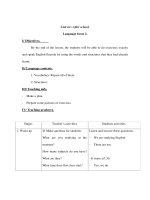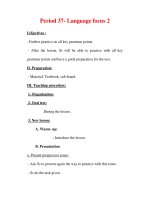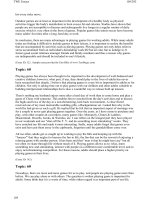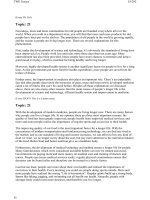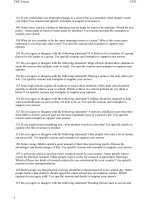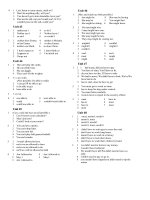In focus 2 sb
Bạn đang xem bản rút gọn của tài liệu. Xem và tải ngay bản đầy đủ của tài liệu tại đây (18.09 MB, 114 trang )
www.frenglish.ru
www.frenglish.ru
www.frenglish.ru
Student’s Book
2
Charles Browne • Brent Culligan • Joseph Phillips
i
www.frenglish.ru
79 Anson Road, #06-04/06, Singapore 079906
Cambridge University Press is part of the University of Cambridge.
It furthers the University’s mission by disseminating knowledge in the pursuit of
education, learning and research at the highest international levels of excellence.
www.cambridge.org
Information on this title: www.cambridge.org/9781107697010
© Cambridge University Press 2014
This publication is in copyright. Subject to statutory exception
and to the provisions of relevant collective licensing agreements,
no reproduction of any part may take place without the written
permission of Cambridge University Press.
First published 2014
Printed in Singapore by Markono Print Media Pte Ltd
ISBN
ISBN
978-1-107-69701-0 paperback Student’s Book 2
978-1-107-62945-5 paperback Teacher’s Manual 2
Additional resources for this publication at www.cambridge.org/infocus
Cambridge University Press has no responsibility for the persistence or accuracy of
URLs for external or third-party internet websites referred to in this publication,
and does not guarantee that any content on such websites is, or will remain,
accurate or appropriate. Information regarding prices, travel timetables, and other
factual information given in this work is correct at the time of first printing but
Cambridge University Press does not guarantee the accuracy of such information
thereafter.
www.frenglish.ru
Contents
Plan of the book
Acknowledgments
iv
viii
To the teacher
ix
How a unit works
x
To the student
xii
UNIT 1
1
UNIT 2
9
UNIT 3
17
UNIT 4
25
UNIT 5
33
UNIT 6
41
UNIT 7
49
UNIT 8
57
UNIT 9
65
UNIT 10
73
UNIT 11
81
UNIT 12
89
Activities
97
Core vocabulary: keywords
Unit-by-unit list
98
Alphabetical list
99
Credits
100
iii
www.frenglish.ru
Plan of the book
Cycle 1
Unit
1
Title/Topic
Reading texts
Reading skills
Vocabulary
A World of
English
1 The Wonder of
Language
Scanning
Collocations
Skimming
2 An English-Speaking
World
Checking details
Word parts: equa /equi
Example: equivalent
English as a global
language
Making inferences
Identifying opinions
Cycle 1
Pages 1–8
2
Where Are All
the Babies?
1 Population Pyramids
Scanning
Collocations
2 Fewer and Fewer
Babies
Skimming
Word parts: pre
Example: previous
Graying populations
Checking details
Reference words
Making inferences
Cycle 1
Pages 9–16
3
The Price of
Excellence
1 Sports and
Competition
Scanning
Collocations
Skimming
2 The Search for Speed
Checking details
Word parts: pend/pent
Example: suspend
Drugs in sport
Cause and effect
Making inferences
Cycle 1
Pages 17–24
4
Cycle 1
Pages 25–32
5
The
Inconvenient
Truth of
Global
Warming
1 What Is Global
Warming?
Scanning
Collocations
Skimming
2 Hotter and Hotter
Checking details
Word parts: dict
Example: predict
Reference words
Identifying opinions
Solutions to global
warming
Changing
Ideals of
Beauty
1 Beauty
Scanning
Collocations
2 What Is Beauty?
Skimming
Word parts: dis
Example: disagree
Checking details
Cause and effect
What makes a person
attractive?
Making inferences
Cycle 1
Pages 33–40
6
1 A Vegetable Diet
Scanning
Collocations
Why people become
vegetarians
2 Vegetarianism: The
Healthy and Moral
Choice
Skimming
Word parts: kilo
Example: kilogram
Checking details
Identifying reasons
Making inferences
Pages 41–48
iv
Vegetarianism
www.frenglish.ru
Critical thinking
Research skills
Writing
Skills
Information gathering
Writing a short paragraph
Identifying fact or opinion
Discussion
Categorizing statements:
positive, neutral, negative
•
•
Identifying loanwords
and their meanings
Pros and cons of English as
a world language
Speaking
Interpreting and reporting
results
•
•
•
•
•
Group survey on family size
Interpreting and reporting
results
•
•
Quotable Quotes
Comparing meanings
Discussing differences
Information gathering
Pros and cons of English
as a global language
Reaching a group consensus
Writing a short paragraph
Summarizing pros and cons
of population changes
Discussing students’
attitudes to use of English
Identifying fact or opinion
Presentation
Categorizing statements:
positive, neutral, negative
•
Effects of population changes
on countries
Introductions and conclusions
Analyzing data relating
to population pyramids
Analyzing and explaining
charts
Tip: Presentation structure
Quotable Quotes
•
Discussing implications of
low birthrates
Information gathering
Writing a short paragraph
Identifying fact or opinion
Discussion
•
Expressing an opinion about
competition and sport
Categorizing statements:
positive, neutral, negative
•
Methods to help athletes
perform their best
Interpreting and reporting
results
•
•
•
Comparing methods
Assessing their impact
Quotable Quotes
•
Information gathering
•
Carbon footprints
Interpreting and reporting
results
•
Considering statements
about competition and
cheating
Reporting and finding out the
majority view
Writing a short paragraph
Summarizing opinions about
global warming
Discussing what motivates
successful people
Identifying fact or opinion
Discussion
Categorizing statements on
a scale of 1 to 5
•
Comparing the efficiency
of different forms of
transport
•
Answering questions on
aspects of global warming
Reporting results of
discussions
Quotable Quotes
•
Discussing effects of global
warming on society
Information gathering
Writing a short paragraph
Identifying fact or opinion
Presentation
•
Summarizing opinions about
staying beautiful and the
money spent on it
Categorizing statements that
the author might make
•
Ranking attractive features
in people
Interpreting and reporting
results
•
Using questions about the
nature of beauty as the basis
for a presentation
Tip: Opening and closing a
presentation
Comparing rankings and
drawing conclusions
Quotable Quotes
•
Discussing whether beauty is
just physical
Information gathering
Writing short statements
Identifying fact or opinion
Discussion
•
Pros and cons of
vegetarianism
Categorizing statements:
positive, neutral, negative
•
Meat consumption by
students
Considering statements
about vegetarianism
Reporting results of
discussions
Interpreting and reporting
results
•
•
•
Quotable Quotes
Comparing results
Analyzing meat
consumption worldwide
•
Discussing whether an
animal’s life is as valuable as
a human’s
v
www.frenglish.ru
Plan of the book
Cycle 2
Unit
7
Title/Topic
Reading texts
Reading skills
Vocabulary
Disappearing
Languages
1 The Rise and Fall of
Languages
Scanning
Collocations
Skimming
2 The Killer Language
Checking details
Word parts: prim
Example: primary
The disappearance
of other languages
because of English
Cause and effect
Making inferences
Cycle 2
Pages 49–56
8
Our Crowded
Earth
Overpopulation
1 The Consequences of
Population Growth
Scanning
Collocations
Skimming
2 The Exploding
Population
Checking details
Word parts: ex
Example: expansion
Making inferences
Identifying purpose
Cycle 2
Pages 57–64
9
Cycle 2
Pages 65–72
10
Do Great
Athletes
Deserve Great
Salaries?
1 The Economics of
Sport
Scanning
Collocations
Skimming
2 Salaries of Top
Sportspeople
Checking details
Word parts: tract
Example: attract
Making inferences
The pros and cons of
high salaries
The Global
Warming
Myth?
Pronouns
1 The Modern Meaning
of Myth
Scanning
Collocations
Skimming
2 Global Warming
Mythmakers
Checking details
Word parts: pro
Example: prospect
Doubts about global
warming
Identifying reasons
Identifying opinions
Cycle 2
Pages 73–80
11
Is Beauty Skin
Deep?
1 Improving on Nature?
Scanning
Collocations
2 The Never-Ending
Desire for Beauty
Skimming
Word parts: poly
Example: Polynesia
Tattoos and cosmetic
surgery
Checking details
Cause and effect
Making inferences
Cycle 2
Pages 81–88
12
Factory farming of
animals
1 Meat Made Man
Scanning
Collocations
2 Animal Slaves
Skimming
Word parts: ab
Example: abuse
Checking details
Identifying reasons
Making inferences
Pages 89–96
vi
Animals as
Food
www.frenglish.ru
Critical thinking
Research skills
Writing
Skills
Information gathering
Writing a short paragraph
Identifying fact or opinion
Presentation
Categorizing statements:
positive, neutral, negative
•
•
Rating jobs that need English
Interpreting and reporting
results
•
•
Pros and cons of English
as the dominant world
language
Speaking
English as the Global
Language
Tip: Use of gestures in
presentations
Comparing lists
Predicting the future
Quotable Quotes
•
Discussing whether
everybody in the USA should
speak English
Information gathering
Writing short statements
Identifying fact or opinion
Discussion
•
Consequences of population
growing or decreasing
Categorizing statements:
positive, neutral, negative
•
Group survey on future
family size
Matching speakers to
statements
Discussing the statements
and reporting to the class
Interpreting and reporting
results
•
•
Quotable Quotes
Comparing results with the
national birthrate
•
Discussing the decision to
have children
Information gathering
Writing a short paragraph
Identifying fact or opinion
Discussion
•
Summarizing arguments
about paying athletes’ high
salaries
Categorizing statements:
positive, neutral, negative
•
Ranking athletes students
would pay to see
Interpreting and reporting
results
•
•
Matching movies to disasters
Interpreting and reporting
results
•
•
Writing a short paragraph
Describing a graph showing
changes in the earth’s
temperature
Group survey on attitudes to
physical features
Presentation
Categorizing statements:
positive, neutral, negative
•
•
Listing animals and their
uses
Interpreting and reporting
results
•
•
Tip: Proper posture in a
presentation
•
Writing a short paragraph
The consequences of
altering one’s appearance
Comparing lists
Discussing how the use of
animals has changed
Discussing the leadership
role of the USA on the issue
of global warming
Identifying fact or opinion
Discussion
Categorizing statements:
positive, neutral, negative
•
How important is appearance
in professional life?
Quotable Quotes
•
Comparing survey results
about appearance
Information gathering
What is an ideal climate?
Quotable Quotes
Interpreting and reporting
results
•
Discussing the contradictions
between sport and
money
Identifying fact or opinion
Discussing why people
watch disaster movies
Information gathering
•
Quotable Quotes
Comparing athletes and
sports
Information gathering
•
Ranking factors for paying
high salaries
Discussing salaries paid for
different jobs
Writing a short paragraph
Arguments for and against
using animals
Discussing making changes
in life that are permanent
Identifying fact or opinion
Discussion
Categorizing statements:
positive, neutral, negative
•
Answering questions
related to the use of animals
by humans
Quotable Quotes
•
Discussing arguments
against keeping pets.
vii
www.frenglish.ru
Acknowledgments
Charles Browne would like to thank his wife, Yukari, and their three children, Joshua, Noah,
and Hannah. Joseph Phillips would like to acknowledge the support of his wife, Miho Tajima,
and their children, who tried to do their best to behave while he was working on In Focus.
Brent Culligan would like to thank his family, who provided most of the motivation to continue
this project, especially when the true extent of the commitment became apparent.
The authors thank Richard Walker for his tireless, patient, and positive support throughout
the entire writing process, and Katherine Wong for her unwavering professionalism and help
during the various stages of the project.
Many people contributed to the development of In Focus. The authors and publisher would like
to particularly thank the following reviewers for their valuable insights:
Glenn Allies, International Graduate School of English, Seoul, South Korea; Shawn Beasom,
Chuo University, Tokyo, Japan; Mark Christianson, International Christian University, Tokyo,
Japan; Andrew Cook, University of Tasmania, Hobart, Australia; Tony Covello, Yeojoo Institute
of Technology, Yeoju, South Korea; Jay Fraser, Soongsil University, Seoul, South Korea; Johnny
Gou, National Taiwan University of Education, Taipei, Taiwan; Jason M. Ham, The Catholic
University of South Korea, Seoul, South Korea; Shu-fen Huang, National Central University,
Zhongli, Taiwan; Mitsuko Izutsu, Sapporo Gakuin University, Sapporo, Japan; Paul Z. Jambor,
Korea University, Seoul, South Korea; Steven Kirk, University of Tokyo, Tokyo, Japan; Yayoi
Kosugi, Keio University, Tokyo, Japan; J. Lake, Fukuoka Women’s University, Fukuoka, Japan;
Tae Lee, Yonsei University, Seoul, South Korea; Michael McCollister, Feng Chia University,
Taichung, Taiwan; Philip Moriarty, Chinese Culture University, Taipei, Taiwan; Kazuhiro Nomura,
Kobe City University of Foreign Studies, Kobe, Japan; Sakae Onoda, Kanda University of
International Studies, Chiba, Japan; Shuji Ozeki, Nagoya University, Nagoya, Japan; Peeriya
Pongsarigun, Chulalongkorn University, Bangkok, Thailand; Woralap Sangvatanachai, Khon
Kaen University, Khon Kaen, Thailand; Chris Shanks, British Council, Bangkok, Thailand; David
Travis Shaw, Indiana University Bloomington, IN, USA; Richmond Stroupe, Soka University,
Tokyo, Japan; Mingjen Tsai, National Pingtung University of Science and Technology, Neipu,
Taiwan; Modesto Tumacder, Dongguk University, Seoul, South Korea; Yoko Wakui, Aoyama
Gakuin University, Tokyo, Japan; Douglas Wood, British Council, Bangkok, Thailand; Jennilee
Yoon, Gachon University, Seongnam, South Korea
The authors thank Chris Caridia and Cambridge University Press staff:
Harry Ahn, Karen Brock, Seil Choi, Leo Chon, Sean Elwell-Sutton, Tomomi Katsuki, Alice Kim,
Nesha Naidu, Jinhee Park, Panthipa Rojanasuworapong, Mario Santos, Satoko Shimoyama,
Ivan Sorrentino, Stuart Vinnie, Irene Yang
Book and cover design by Designers Collective
Book layout by Transnet Pte Ltd
Illustrations by LiDan Illustration & Design Studio, and Albert Tan
Audio production by Anzak Modern Music Productions
viii
www.frenglish.ru
To the teacher
Welcome to In Focus, a three-level, corpus-informed course aimed at university
and college students. In Focus is designed to build vocabulary, reading, discussion,
presentation, and critical thinking skills. Each Student’s Book contains 12 topic-based
units, which are divided into two cycles of six general themes. Units follow a light
gradation of difficulty, which allows you to vary the order in which you teach them
according to your students’ interests and time. In Focus is supplemented by a range
of free, dedicated online components, which provide great flexibility and help to
speed language acquisition.
Using the multi-billion-word Cambridge English Corpus, we have created a unique
lexical syllabus containing the most important words for second language learners of
English. This syllabus comprises two word lists: a New General Service List (NGSL),
a list of approximately 2,800 words; and a New Academic Word List (NAWL), a list of
approximately 1,000 words that are especially useful for students who want to read
academic texts in English. Together, these 3,800 words allow learners to understand
92 percent of the words in most English academic texts; these are nearly all the
words learners will ever need (not bad, if you consider that there are more than
600,000 words in English!). In each level of In Focus, 120 of these words are taught in
depth (10 per unit). In levels 1 and 2, these words are taken from the NGSL, while in
level 3 they are taken from the NAWL. Students can use the online tools developed
especially for In Focus to learn the remainder of the 3,800 words.
Though In Focus can be used as a standalone textbook, dedicated online elements,
including both website and smartphone apps, enable students to personalize
and extend their learning beyond the classroom. Among the online components
are hundreds of hand-selected authentic videos, audio recordings of all reading
texts, and a spaced-repetition vocabulary learning system. An easy-to-use learner
management system allows you to set up a class and track your students’ progress,
whether they are using a computer or a mobile device. At the back of each Student’s
Book is a code, which gives your students free access to the online elements
(www.cambridgeinfocus.org).
In Focus 2 is designed for students at an intermediate level. The 120 keywords
are taken from the NGSL. Each unit is designed to help your students build both
their knowledge and their ability to think critically about a wide range of important
topics. The topics covered are the English language, population, sports, climate
change, fashion and beauty, and the use of animals. Language prompts are
provided throughout to help students express themselves. Four units also focus on
presentation skills and offer useful presentation tips.
The In Focus Teacher’s Manual contains full step-by-step teaching notes, unit-by-unit
summaries, language notes, tips, extension activities, options for assessment, and a
complete answer key.
We hope you and your students enjoy using In Focus.
Charles Browne
Brent Culligan
Joseph Phillips
ix
www.frenglish.ru
How a unit works
All units in In Focus are eight pages long and follow a similar format. Where
appropriate, icons indicate that students can access the companion website or app
for additional practice of the material. An audio icon also reminds students that they
have the option of listening to the reading texts (available free from the website).
Unit organization
Objective
Warm up
Page 1
Schema building
Real world
connection
Vocabulary
Pages 2–3
development
Reading
Speaking
Section
1 Critical cartoons
Building knowledge
Media link
2 Core vocabulary
Scanning and skimming
Words in context: collocations
Word parts
Discussion dictation
3 Reading skills
Pre-reading questions
Pages 4–5
Reading
Reading
Reading skills
Checking details; Making
inferences; Identifying opinions/
purpose/reasons; Cause and
effect; Pronouns; Reference words;
Speaking
Going beyond the text
Page 6
Gathering,
comparing,
and analyzing
information
Speaking
Critical thinking
skills
Pages 7–8
Information gathering
Interpreting and reporting results
5 Critical thinking
Fact or opinion?
Writing
Categorizing
Discussion
Writing
Presentation
Presentation skills
x
4 Researching a topic
Discussion; Presentation
Quotable Quotes
www.frenglish.ru
Unit sections
1 Critical cartoons
This is a short speaking activity centered on a cartoon related to the topic of the unit.
The look and feel of the cartoon is that of a political cartoon that might be found in a
newspaper. Questions help activate schema and develop critical thinking skills.
2 Core vocabulary
Each unit teaches 10 important words from the NGSL. The section begins with a short
reading passage (200–250 words) on an aspect of the unit topic that contextualizes
the 10 keywords. A series of learning activities focuses on developing knowledge
of collocations and analyzing and understanding word parts. This gives students
practice using the words introduced in the unit. It also develops vocabulary learning
skills and strategies that will be useful when encountering new words not introduced
in the unit. A speaking activity rounds this section off.
3 Reading skills
Students work with a longer text (400–500 words), which gives a different or
expanded point of view on the topic of the unit. This exposure to multiple points
of view is a key aspect of developing skills in critical thinking. This is followed by
a series of carefully structured activities, including pre-reading, comprehension,
making inferences, and identifying opinions. The section culminates in a short
discussion.
4 Researching a topic
Since information from various points of view is crucial to thinking critically about
an issue, the pair or group activities in this section encourage gathering further
information related to the topic. This is followed by interpretation and presentation of
the information collected.
5 Critical thinking
Through pair, group, and open class work, students are encouraged to develop
critical thinking skills, such as identifying the difference between statements of
fact and opinion, analyzing graphs, and categorizing data. A language model helps
students to write a short paragraph and express their opinions on the topic. The final
page brings the content of the unit together in a discussion or presentation about the
topic. Useful language prompts help students where necessary.
6 Quotable quotes
This final section introduces a quote on the topic of the unit, in most cases by a
famous person. Several thought-provoking questions on the quote conclude the
unit. This section can be done in class as a short discussion activity or as a writing
assignment outside the class.
xi
www.frenglish.ru
To the student
Welcome to In Focus, a three-level course for university and college students. We
have designed this series to help you build your vocabulary and improve your
reading skills as well as your discussion and presentation skills. In Focus will also
help you think critically, which is a very important general academic skill. In each
Student’s Book, you will find 12 topic-based units. In addition to the Student’s Book,
there is a range of free online components, which will help you focus on what you
really need and so learn more quickly.
For In Focus, we have created a unique vocabulary syllabus containing the most
important vocabulary words for learners of English. This syllabus has a total of
about 3,800 words, which are nearly all the words you will ever need: if you know
these words, you will understand 92 percent of the words in most English academic
texts (not bad, if you think that English has over 600,000 words!). You will learn 120
of these words in each book, 10 per unit. You can use the website and smartphone
apps developed especially for In Focus to learn the rest of the 3,800 words efficiently
and enjoyably. We have designed a special vocabulary learning system for you to
do this. Online, you will also find hundreds of interesting videos related to the unit
topic, audio recordings of the reading texts, and other activities. At the back of each
Student’s Book, there is a code, which will give you free access to all the online
elements (www.cambridgeinfocus.org).
In Focus 2 is designed for students at an intermediate level. Each unit will help you
build your knowledge about a wide range of interesting topics as well as help you
think critically about these topics. You will learn about the use of English in the world,
population changes, issues about sports, climate change, fashion and beauty, and
how people use animals. We have given you useful language where you need it to
guide and help you express yourself. Four of the 12 units also provide presentation
skills and useful presentation tips.
We wish you good luck using In Focus. We are sure that the book and the online
materials will help you learn English quickly and in a fun way!
Charles Browne
xii
Brent Culligan
Joseph Phillips
www.frenglish.ru
A WORLD OF
ENGLISH
Unit
1
1 Critical cartoons
A Building knowledge
Work with a partner or in small groups. Discuss the questions below.
1 How many countries can you name where English is spoken as a first language?
2 What countries do you know where English is not a first language but is a main or
official language?
3 What is the message of the cartoon?
4 Think about the use of English among your grandparents’ generation, your parents’
generation, and your own. How has it changed?
Media link
The Story of English is an award-winning television series and companion
book about the development of the English language.
For additional media links, go to www.cambridgeinfocus.org
1
www.frenglish.ru
UNIT 1
2 Core vocabulary
A Scanning and skimming
1
Find and underline the keywords in the passage. Try to guess their meanings.
Keywords
acquire
equivalent
estimate
exposure
multiple
per
regional
researcher
retain
struggle
The
Wonder of Language
5
10
15
20
25
We all speak one. Every day, people communicate with one another using
language. From the thousands of words we know, we easily find the words we
need and arrange them into sentences to give our opinions or make requests.
Some researchers who study language acquisition, like the well-known writer on
language Steven Pinker, estimate that people know about 50,000 to 60,000
words by the age of 20. That is roughly equivalent to learning eight or nine
words per day from birth.
This amazing process begins at birth. Children who have not yet learned to
speak listen to their mothers, fathers, brothers, and sisters talk to them. This
early exposure introduces the child to the sounds of their language. This is
when they begin to acquire their regional accent. We are all amazed at how
little American babies sound American, while little English babies speak with a
British accent.
By the time children become three, they
have usually acquired many thousands of
words. Some words children have heard
multiple times, so it is not surprising
that they know them. Other words
children may hear only once, but they
retain the meaning. Some words are
difficult, and the child has to struggle to
say the word but still has no problem
remembering its meaning.
Learning a foreign language may be
difficult, but it is important to remember
that people are born to communicate
through speech. It is a gift we all have.
2
Read the statements below. Which best describes what this text is about?
ut?
Circle A, B, or C.
A How we learn foreign languages
B How children acquire their accents
C How we learn our own language
2
www.frenglish.ru
UNIT 1
B Words in context: collocations
1
Look at the text on page 2. Find the keywords
that form collocations with the words below.
Collocations are common word
combinations. For example, the verb
express is often found with the noun
opinion, as in express your opinion.
1 researchers
2 roughly
day
3
4
accent
2
Collocations
Match the four keywords with the words below to make new collocations.
1
2
3
4
5 average
6 cash
7
8
costs
amount
government
month
director
year
C Word parts: equa or equi
Example: equivalent
Words with equa/equi
adequate
equinox
1
equation
equivalent
equator
equidistant
inequality
Use the words in the box to complete the sentences below.
A kilogram is roughly
to two pounds.
When something is
, it is enough for a situation.
A mathematical statement in which both sides are the same is an
.
We can see
in a society when groups of people are treated differently.
When a place is the same distance from two other places, we can say they are
.
6 The invisible line that divides the earth into northern and southern halves is called the
.
7 The time when the sun is directly over the equator and night and day are the same
.
length is called an
1
2
3
4
5
2
Work with a partner. What do you think equa/equi means? Write your guess below.
Then check your answer with another partner.
.
I think equa /equi means
D Discussion dictation
1
Listen and write down the questions. Then discuss them in small groups.
1 How
2 How
3 What
2
?
.
?
Form new groups and compare your answers.
3
www.frenglish.ru
UNIT 1
3 Reading skills
A Pre-reading questions
1
How many people around the world do you think are learning English?
h?
2
Why do you think English has become an international language?
B Reading
Read the text and check your answers to the pre-reading questions above. Then
highlight an interesting idea in each paragraph.
5
10
15
20
25
30
35
4
English is widely spoken in many countries around
the world and is an official language in more than
50. Many of these countries are former colonies of
Britain and retained English after independence.
But even former colonies of France and Belgium,
such as Madagascar and Rwanda, have adopted
English as an official language.
English has truly become an international
language. Researchers at the British Council
estimate that it is spoken as a first language by
375 million people and as a second language
by another 375 million. Meanwhile, over 750
million people speak it as a foreign language, and
this number is rapidly growing. In China alone,
120 million grade school students are learning
English. According to the British Council, two
billion people around the world are attempting to
acquire English, and one in four can speak
some English.
When the captain of a Mexican passenger plane
flies into an airport in France or Germany, he or
she communicates with the air traffic controller
in English. It is easy to understand why: the
pilot may not speak French or German, the air
traffic controller may not speak Spanish, and it
is necessary to confirm details about the flight.
However, in the equivalent situation, when the
same plane lands in Argentina or Colombia, the
pilot again communicates with the ground in
English, even though he and the ground controller
both have Spanish as their mother tongue. This
is just one example of how English is used as
the standard international language around the
world. Today, three-quarters of the world’s mail,
most books, and half of the world’s newspapers
and magazines are written in English. English
websites are being created at a rate of 500 per
minute, and more than half of the world’s websites
are in English. Eighty percent of international
organizations use English as an official language,
including the United Nations, the European Union,
and the International Olympic Committee. English
is the most important language in science: half the
world’s scientific papers are written in it. Finally,
in the world of entertainment, it is impossible to
avoid exposure to English. Hollywood movies sell
the most tickets in cinemas, and popular songs in
countries from Sweden to Japan are sung
in English.
English is an international language because
of two main regional influences. The first is the
rule of the British Empire, which at its peak in
1922 governed a fourth of the world’s area and
a fifth of its population. The second is the power
of American companies that spread around the
world after World War ll.
English is not just an international language
because it is spoken all over the world. English
now belongs to the world. People all over the
world do not just struggle to learn it in order to
get better jobs. They add words and expressions
of their own, and they are changing the language
in multiple ways, thus helping to make English a
true world language. English as a world language
allows all countries to be part of the world
community, and this benefits us all.
40
45
50
55
60
65
www.frenglish.ru
UNIT 1
C Checking details
Read the questions below and circle the correct answers according to the text.
1 Which of the following statements is true?
A There are more speakers of English as a first language than speakers of English as a
second language.
B The majority of English speakers speak it as a first language.
C Approximately 25 percent of people in the world can speak some English.
D Nearly 50 percent of international organizations use English as an official language.
2 Which of the following statements is NOT true?
A Many former British colonies kept English as an official language after independence.
B Some former French colonies also have English as an official language.
C Mexican pilots speak Spanish when communicating with air traffic controllers in
Colombia.
D Most of the world’s books are written in English.
D Making inferences
Read the questions below and circle the correct answers according to the text. (There
may be more than one correct answer.)
1 People around the world want to acquire English because . . .
A they want to understand Hollywood movies.
B air traffic controllers need English.
C they want better jobs.
D they want to learn about American companies.
2 Which of these changes are likely to take place in the future?
A English vocabulary will grow.
B English will not be spoken at meetings of the Olympic Games Committee.
C Pilots will choose which language to speak when they are in the air.
D English will become a world language.
E Identifying opinions
Work with a partner and answer the question below. Check (✔) the boxes.
In this article, how can the author’s point of view best be described?
Paragraphs 1–4
positive
neutral
negative
positive
neutral
negative
Paragraph 5
Going beyond the text
Work with a partner or in small groups. Ask and answer the questions below.
1 Look back at the ideas you highlighted in the text. Are they the same?
2 Give at least two examples of the spread of English in your country.
3 Are there any languages that could one day compete with English?
Explain which language and why (or why not.)
5
www.frenglish.ru
UNIT 1
4 Researching a topic
A Information gathering
1
2
Work in small groups. Use the pictures below to identify words English has
borrowed from other languages. Can you guess which language they came from?
A
B
C
D
E
F
G
H
Think of six words from your language that came from English. Then look up the
meaning of the words in English in a dictionary or online. Complete the chart below.
Borrowed word
Meaning in
your language
Meaning in
English
1
2
3
4
5
6
B Interpreting and reporting results
Form new groups and compare your findings. Discuss the questions below.
1 Which meanings are the same in both English and your language? Can you think of
any that are different?
2 Why do you think the meaning of some borrowed words is different in your language?
3 Do you think borrowed words help you acquire English more easily? Why or why not?
We found that they don’t
always help because . . .
6
It looked to us
as if . . .
Perhaps the first users of
the word didn’t . . .



